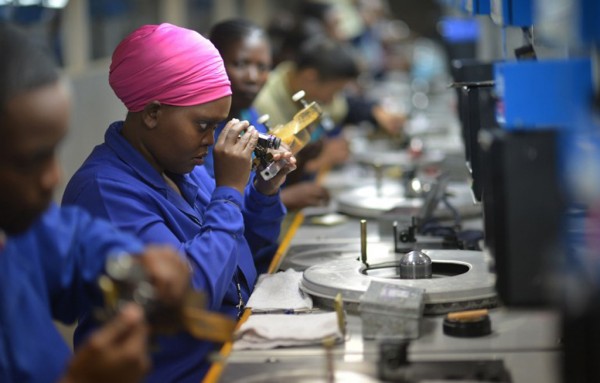Over recent years, few areas of international development research have seen as much transformation as those relating to energy access and carbon transitions. Ghana, amongst other African economies, has seen an increase in energy demand surpassing the supply of energy in the last decades.
The incorporation of renewable energy into the mix is, therefore, seen as a significant role in addressing the energy needs by replacing conventional fuels with clean and reliable domestic electricity with the advantage of local economic opportunities.
 Ghana’s energy mix is relatively simple though not without challenges. The country relies on biomass/ charcoal, gas and crude oil, and electricity to meet the total energy needs of its population and industry. In 2015s, oil contributed 44.48% to the primary energy supply, followed by biomass 37.87%, hydroelectricity 5.27%, and natural gas 12.38%.
Ghana’s energy mix is relatively simple though not without challenges. The country relies on biomass/ charcoal, gas and crude oil, and electricity to meet the total energy needs of its population and industry. In 2015s, oil contributed 44.48% to the primary energy supply, followed by biomass 37.87%, hydroelectricity 5.27%, and natural gas 12.38%.
Ghanaians have traditionally relied on biomass and waste, particularly firewood and charcoal, however, the share of biomass in Ghana’s energy mix has been steadily declining because of increasing fossil fuel consumption. According to Ghana’s national energy statistics, the share of biomass consumption declined from 52% of the total primary energy supply in 2009 to 37% in 2016.
 Currently, however, the electricity demand outnumbers supply thereby creating an erratic electricity distribution situation. Electricity is, therefore, rationed, leaving a supply gap for renewable energy to fill.
Currently, however, the electricity demand outnumbers supply thereby creating an erratic electricity distribution situation. Electricity is, therefore, rationed, leaving a supply gap for renewable energy to fill.
Ghana has adopted the United Nations Sustainable Development Goals 7 (SDG 7), which targets to ensure universal access to affordable, reliable, and modern energy services. This target presents a formidable challenge to Ghana because the country still relies mainly on traditional biomass as its primary source of energy coupled with a chronically fragile hydropower sector. Nonetheless, since 2015, petroleum products have overtaken biomass and both have environmental consequences.
 The country has a huge potential for renewable energy that remains underexploited. To convert these renewable potentials into actual energy, the government in 2006 set a target of achieving 10 per cent in the electricity mix by 2020. The government in 2010 introduced a law on Renewable Energy to parliament. One of the main goals of the Renewable Energy Law (Acct 832) and the strategic National Energy Plan 1 is to increase the share of modern forms of renewable energy to 10% in terms of power generation. Regrettably as of October 2018, the percentage of renewable energy was less than 2 per cent.
The country has a huge potential for renewable energy that remains underexploited. To convert these renewable potentials into actual energy, the government in 2006 set a target of achieving 10 per cent in the electricity mix by 2020. The government in 2010 introduced a law on Renewable Energy to parliament. One of the main goals of the Renewable Energy Law (Acct 832) and the strategic National Energy Plan 1 is to increase the share of modern forms of renewable energy to 10% in terms of power generation. Regrettably as of October 2018, the percentage of renewable energy was less than 2 per cent.
The involvement and development of renewable energy sources in Ghana can be traced from the mid-1960s when the hydroelectric dam was constructed after the country depended on a few isolated diesel power generators across the country. About four decades later, hydropower gained recognition and acceptance to be the main source of energy supply contributing substantially to the energy mix of the country.
 Ghana in recent spans has been the centre of West Africa for its fast-paced urbanization, particularly across fields of education, technology and economy. With industrialization, the country’s demand for electricity has been growing. This has, therefore, prompted the government as well as public sectors to seek alternative renewable energy sources to complement the currently dominant hydropower energy supply such as the Akosombo Dam and Volta River.
Ghana in recent spans has been the centre of West Africa for its fast-paced urbanization, particularly across fields of education, technology and economy. With industrialization, the country’s demand for electricity has been growing. This has, therefore, prompted the government as well as public sectors to seek alternative renewable energy sources to complement the currently dominant hydropower energy supply such as the Akosombo Dam and Volta River.
The nation has been struggling with increased power rationing which was popularly known as ‘Dumsor’ over the past 10 years (Gyamfi et al,2015), due to the Volta River authority’s inability to generate enough electricity for all the demand sectors.
The expansion of renewable energy is therefore imperative to Ghana not only to fulfil people’s electrical needs but also to take initiatives in reducing carbon emissions and in combating climate change. With these energy crises relative to economic growth, it is evident and viable for Ghana to expand, diversify and explore more alternative energy sources in order to increase its generation capacity for meeting the recent supply deficits.
Renewable energy encompasses a broad range of sources and technologies, with some more favoured for their greenness than others. For example, some consider solar and wind power preferable to hydropower with massive dams which can release greenhouse Gases (methane). Ghana should go in for renewable energy because:
• As it is renewable, it is sustainable and so will never run out as compared to fossil fuels.
• Renewable energy facilities generally require less maintenance than traditional generators. Their fuel being derived from natural and available resources reduce the cost of operation as it will also reduce the country’s dependence on fuels and energy from foreign governments.
• They are the cleanest and most promising energy sources for future generations, with stable prices and are environmentally friendly due to zero carbon emissions.
Without a doubt, Ghana possesses the remarkable potential to significantly boost local energy production and improve the efficiency of energy delivery systems to achieve SDG 7. Ghana will need to institute practical measures to turn theoretical potential into reality. The country will need to pursue goals of providing sustainable energy for all, with steady developments for the various kinds of renewable energy.


